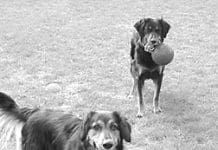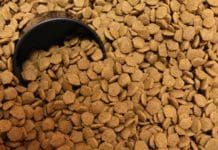Home Search
raw - search results
If you're not happy with the results, please do another search
Answers From Experts 04/99
St. John’s Wort (Hypericum perforatum) IS often used in topical wound healing creams and ointments, as it demonstrates broad-spectrum antimicrobial activity. Taken internally, however, it has not demonstrated any ability to heal injuries, but has well-documented abilities to lift depression and lessen anxiety.
Food For Thought
I switched Duke’s food to one of your top picks, and in just the few months that he has been on this food I have noticed a much healthier dog.
Consider Me Converted
I now can honestly say I'm a dog person
Seizures, Mobility Cart Rentals, and “Show People”
I feel the cause of my dog's DI dates back to rabies vaccinations. Three weeks following his 1993 vaccination, we thought he was bloating. He was also in extreme pain in the kidney area. We rushed him to the veterinarian. Radiographs showed nothing unusual, but he showed some neurological deficits. We took him back the next morning for more x-rays, and did some blood tests, etc., but found nothing. The veterinarian gave him prednisone and he improved almost immediately. He showed no further problems until the next spring, when he had his next rabies shot. Same symptoms, but he didn't get better this time. We took him to Auburn University, and $500 worth of tests showed nothing. In August, he woke us up trying to lift the toilet lid, and getting in the shower and tub searching for water. He was finally diagnosed as diabetic, and went on DDAVP.
Canine Counselor
says Frost. This unconditional acceptance that dogs extend to us is one of the nicest perks that this special relationship offers us.
Another benefit we gain from our dogs is a sense of expansiveness and ease. People tend to be more open around animals, and dogs in particular. Frost notes, We are often more open
Half-Baked Idea?
but they are not likely to be any less destructive to the nutrients.
Nonetheless
Answers From Experts 02/99
We love our Labrador Retriever, Bailey, very much. We rescued her when she was six weeks old. She is now almost two years old. We believe that a dog is part of the family and therefore should live inside the house with the rest of the family. However, we were warned about Labs and their desire to chew and need for a lot of exercise. We were prepared for the worst. We limited Bailey’s living quarters to the kitchen and family room.
Target-Train Your Dog to Ring A Doorbell
Each month, I stand in the middle of my training center during the second session of my newest Level One class and introduce my...
Veggies Yes, Onions No
Too many onions can cause a condition called “Heinz body anemia” in dogs, and though it actually takes quite a whopping dose of onions to cause harm, they are not recommended for dogs in any amount. An editing error saw the inclusion of onions on the list of vegetables that can be added to a dog’s diet. We apologize for the error. Dr. Richard Pitcairn states that chopped parsley, alfalfa sprouts, finely grated carrots, and finely grated zucchini are dogs’ favorite raw vegetables, and corn, peas, green beans, and broccoli are best fed cooked.
Toxins That Can Arise in Dry Dog Food
For those of you just coming on board: In the July 2000 issue, we published an article called Hidden Killer in Dog Food." The article was inspired by a "case history" we received from a reader who had been through a harrowing experience with her dog. It took the reader several months and a small fortune to determine that the sudden onset of very strange and serious neurological problems with her dog was caused by a naturally occurring toxin in her dog's food. As we stated in that article
Itching and Wondering
and I didn't want to revaccinate him.
Long story short? Rupe got a ticket for walking off leash and for being unlicensed.
Had this been
Action Packed
We introduce dog owners to the concept of pediatric spay and neuter surgery – performed when a puppy is just six to 14 weeks old. Animal protection professionals regard the procedure as the tool that may finally make a significant dent in the animal overpopulation problem, a cause we wholeheartedly support. Immediately following that article, however, is one that addresses concerns about the procedure that some holistic veterinarians have (“Can I Spay Later?”). Is it more important to take the action that will help the entire canine population, or the one that will be best for your individual dog? We try to help you find a win/win solution.








